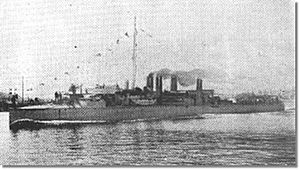Greek destroyer Nafkratousa facts for kids

Nafkratousa
|
|
Quick facts for kids History |
|
|---|---|
| Name | Nafkratousa |
| Ordered | 1905 |
| Builder | Yarrow Shipbuilders, Cubitt Town, London |
| Laid down | 1905 |
| Launched | 1906 |
| Commissioned | 1906 |
| Decommissioned | 1921 |
| Fate | Wrecked on Milos |
| General characteristics | |
| Class and type | Thyella class destroyer |
| Displacement | Standard 350 long tons (360 t) |
| Length | 67.1 m (220 ft) |
| Beam | 6.2 m (20 ft) |
| Draft | 1.8 m (5 ft 11 in) |
| Propulsion | 2 shafts, 6,000 hp (4,500 kW) |
| Speed | 30-knot (56 km/h) maximum |
| Complement | 70 |
| Armament | Gun 2 × 3-inch (8 cm) 12-pounder Hotchkiss Single & Gun 2 × 57-millimetre (2 in) 6-pounder 40cal Hotchkiss QF Single |
The Nafkratousa (which means "Naval Power" in Greek) was a type of warship called a destroyer. It was part of the Royal Hellenic Navy of Greece. This ship served from 1906 to 1921.
Building a Fast Warship
The Nafkratousa was one of four similar ships, all part of the Thyella class. These ships were ordered from Britain in 1906.
The Nafkratousa was built at the Yarrow Shipbuilders shipyard. This shipyard was located in Cubitt Town, a part of London. It was designed to be fast, reaching speeds of up to 30 knots (about 55 kilometers per hour).
Adventures in Wartime
During World War I, Greece joined the war later on the side of the Triple Entente. Because Greece had been neutral for a while, the four Thyella class ships, including Nafkratousa, were taken by the Allies in October 1916.
The French Navy then took control of them in November 1916. These ships served with the French Navy during 1917 and 1918. By 1918, they were returned to Greece. They then helped protect other ships, mostly in the Aegean Sea.
Nafkratousa also took part in the Greco-Turkish War (1919-1922). This was a conflict between Greece and Turkey.
The End of the Journey
While performing training exercises during the Greco-Turkish War, the Nafkratousa had an accident. It ran aground, meaning it hit the bottom, near the island of Milos.
The ship was badly damaged and could not be saved. This happened in 1921, marking the end of its service.
See also
 | Toni Morrison |
 | Barack Obama |
 | Martin Luther King Jr. |
 | Ralph Bunche |

